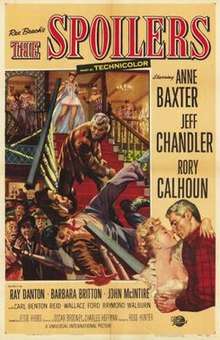The Spoilers (1955 film)
The Spoilers is a 1955 Technicolor Western film directed by Jesse Hibbs and starring Anne Baxter, Jeff Chandler and Rory Calhoun. Set in Nome, Alaska during the 1898 Gold Rush, it culminates in a spectacular saloon fistfight between Glennister and McNamara.
| The Spoilers | |
|---|---|
 | |
| Directed by | Jesse Hibbs |
| Produced by | Ross Hunter |
| Screenplay by | Oscar Brodney Charles Hoffman |
| Based on | Rex Beach (novel) |
| Starring | Anne Baxter Jeff Chandler Rory Calhoun |
| Cinematography | Maury Gertsman |
| Edited by | Paul Weatherwax |
Production company | Universal Pictures |
| Distributed by | Universal Pictures |
Release date |
|
Running time | 84 minutes |
| Country | United States |
| Language | English |
| Box office | $1.4 million (US)[1] |
Film versions also appeared in 1914, 1923 (with Noah Beery, Sr. as McNamara), 1930 (with Gary Cooper as Glennister and Betty Compson as Malotte), and 1942 (with John Wayne as Glennister, Betty Compson lookalike Marlene Dietrich as Malotte, and Randolph Scott as McNamara). The 1930 and 1942 versions were the only instances of Gary Cooper and John Wayne playing the same role in the same story in two different films; Jeff Chandler portrays the part in this version.
Plot
Struggling miners Flapjack and Banty go to the office of Alex McNamara, the new gold commissioner in Nome, Alaska, to complain about claim jumpers. He isn't there, so they drown their sorrows at Cherry Malotte's gambling house and saloon.
Cherry looks ready to steal the men's claim herself in Alex's office when he suddenly appears. He assures her Judge Stillman is on his way to Nome to review all legal matters regarding the mines.
When a ship arrives bringing her sweetheart Roy Glennister back to town, Cherry runs out eagerly to meet it, to the jealousy of Blackie, her croupier. To her anger, Roy is traveling with an attractive stranger, Helen Chester. An irate Cherry leaves in a huff with Roy's co-owner of a nearby mine, Dextry.
Roy insists he still loves Cherry, but she slaps his face. Alex and the newly arrived Judge Stillman set out to survey and inspect Roy's mine, insisting it will take weeks before any claims can be settled. Roy is shocked to observe that Alex, the Judge and Helen are all conspirators to steal the miners' claims.
Blackie shoots the town marshal and makes sure Roy is blamed and arrested for it. A jailbreak is arranged, but Cherry rushes to warn Roy of what she has learned from Helen, that as soon as he escapes, Alex is planning to ambush Roy and make it look like a lawful shooting.
A shootout between Alex and the miners ensues. Blackie dies, but not before confessing to the sheriff's murder, while Roy and Alex end up in a knockdown, drag-out fistfight. Cherry and Roy ultimately end up happily in love and in legal possession of the mine.
Cast
- Anne Baxter as Cherry Malotte
- Jeff Chandler as Roy Glennister
- Rory Calhoun as Alexander McNamara
- Ray Danton as Blackie
- Barbara Britton as Helen Chester
- John McIntire as Dextry
- Wallace Ford as Flapjack Simms
- Forrest Lewis as Banty Jones
- Carl Benton Reid as Judge Stillman
- Raymond Walburn as Mr. Skinner
- Ruth Donnelly as Duchess
- Dayton Lummis as Wheaton
- Willis Bouchey as Jonathan Struve
- Roy Barcroft as the Marshal
- Byron Foulger as Montrose aka Monty
- Robert Foulk as Bartender
- Arthur Space as Bank Manager
- Harry Seymour as Piano Player
- Bob Steele as Miner
- Eddie Parker as Berry (as Edwin Karker)
- Lee Roberts as Deputy
- John Close as Deputy
Production
The film starred Jeff Chandler, Anne Baxter and Rory Calhoun.[2] Robert Arthur originally was to produce and he supervised the script and original casting, but was replaced by Ross Hunter.[3]
See also
References
- 'The Top Box-Office Hits of 1956', Variety Weekly, January 2, 1957
- THOMAS M. PRYOR (Dec 13, 1954). "PLAY BY WILLIAMS PLANNED AS FILM: ' Summer and Smoke' Slated by Hal Wallis -- Holden Is Sought as Co-Star". New York Times. p. 34.
- THOMAS M. PRYOR (Jan 6, 1955). "KIRK DOUGLAS SET TO ACTIVATE UNIT: Actor's Bryna Productions Will Make Six Films Under United Artists Contract". New York Times. p. 23.